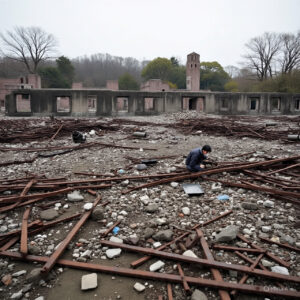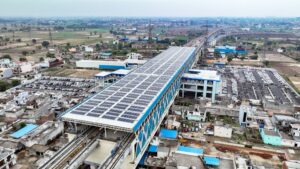There is a famous line of Urdu poetry.
तारीख़ की नज़रों ने वह दौर भी देखा है।
लम्हों ने ख़ता की थी सदियों ने सज़ा पाई।
The eyes of history have seen that era too.
Moments committed mistakes and centuries got punished.
The day of August 9, 1945, when the atomic bomb was dropped on Hiroshima, is a dark chapter in human history. It was not just the destruction of a city, but a wound on the heart of humanity. It was a deep wound that has not healed even with time. What happened that day was not just a war strategy but a cruel and inhumane act committed against innocent civilians.
When we look at the ashes of Hiroshima, we realize how easily human morality and compassion are trampled upon in the arrogance of power and strength. The deliberate targeting of millions of civilians shows what kind of mentality people have. People are still at the helm of our society and nations.
Misuse of power and social boycott
This question is very important whether people who commit such crimes should not be socially boycotted
Can it be? Should people whose decisions destroyed thousands of lives get respect and acceptance in society? The simple answer is no. Such people should not only face legal punishment but also social rejection. Unless we Unless we collectively condemn such acts and marginalize the perpetrators by removing them from their positions, it will not be possible to stop such crimes.
If society continues to give power and respect to such people, they will continue to carry on with their inhumane acts. There will be more motivation to continue. We must understand that true strength lies in protecting humanity, not in destroying it.
After the atomic bomb attack on Hiroshima, its effects were limited to immediate destruction only. They were not, but they had long-lasting and profound effects on Japan and the whole world. These effects can be clearly seen on human life, social structure, and international relations.
Effects on humanity
- Immediate destruction and death: Immediately after the bomb fell, thousands of people were killed. The extreme heat, blast wave, and “black rain” generated by the explosion reduced most of the city to ash.
- Effects of radiation: Many of those who survived developed serious radiation-related illnesses. Major health effects caused by radiation include:
- Leukemia and various types of cancer
- Hair loss
- Vomiting and diarrhea
- Bleeding gums
- Impaired growth (in children
- High rates of miscarriage and birth defects in pregnant women
- Hibakusha (explosion victims): Those who survived are called “hibakusha”
Not only did they suffer physical pain, but they also faced social scorn. Many considered them the source of illness, due to which they faced difficulties in marriage and employment.
- Mental and psychological trauma: The tragedy left a deep impact on people’s minds. Fear, despair, and mental anguish engulfed them for life.
Countries react
- Surrender of Japan: Following the attacks on Hiroshima and then Nagasaki three days later, Japan surrendered unconditionally on August 15, 1945, ending World War II.
- Change in International Relations: The use of atomic bombs on Hiroshima and Nagasaki introduced the world to the destructive power of nuclear weapons. It started a nuclear arms race and forced nations to think about whether they will use such weapons in future.
- Demand for nuclear disarmament: After this tragedy, a strong movement for nuclear disarmament and peace started across the world. Organizations like the United Nations and other International forums stressed the need to abolish nuclear weapons.
- Rebuilding Hiroshima: Japan recovered from the tragedy and developed Hiroshima as a peace memorial. Today, the Hiroshima Peace Memorial Museum and Peace Parks are a reminder of the dangers of war and the importance of peace.
- Lessons for the future: The tragedy of Hiroshima showed the world how dangerous the path of war and violence can be for humanity. This incident reminds us of the dangers of war and violence. It reminds us that we should always give priority to peace and cooperation.
Preventing crimes: Is it possible? This question often arises whether it is possible to prevent such crimes? The answer is yes, it is possible. It is absolutely possible. But for this we should not depend only on governments and leaders. We all have to work together in this direction. For this we have to take the following steps:
- Awareness: We have to make people aware about the real consequences of war.
- Education: We have to teach the values of peace, tolerance and humanity to our future generations.
- Activism: We must oppose all policies and decisions that promote violence and war.
Unless every citizen becomes a supporter of peace, events like Hiroshima cannot be repeated. It will not be possible to stop it.
The wounds of Hiroshima remind us every moment that no victory at the cost of humanity and peace is permanent. Let us all together build a society where love And may tolerance triumph, and the destructive forces of war be defeated forever.




